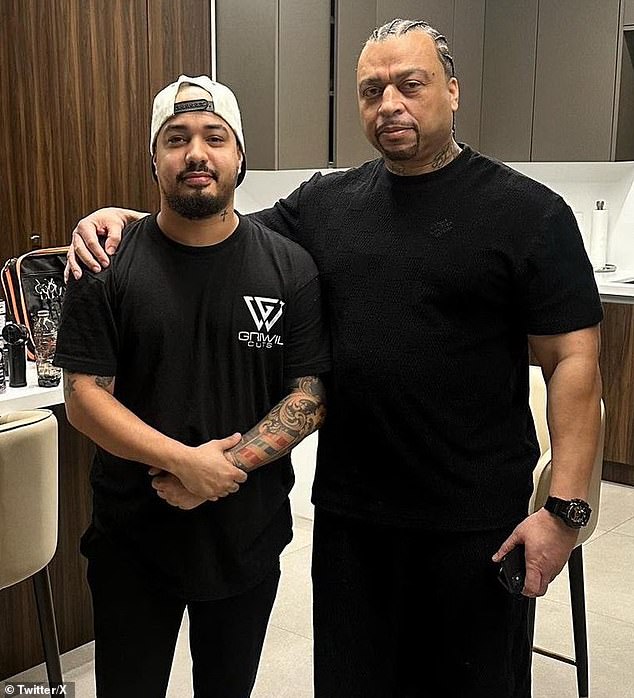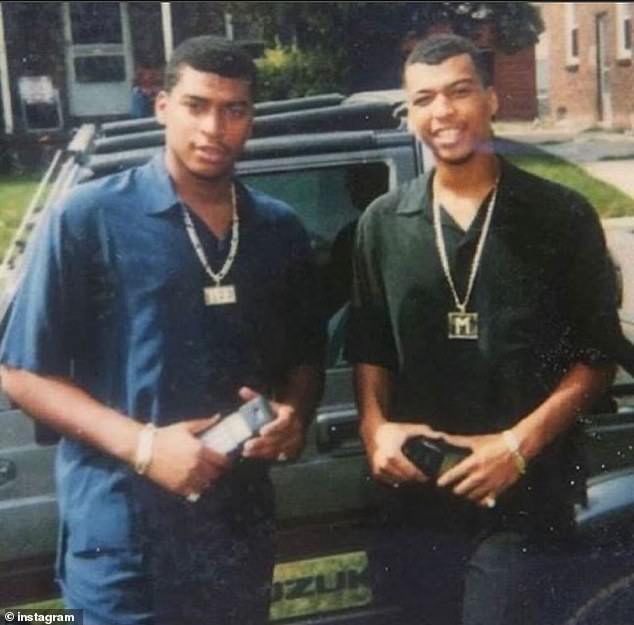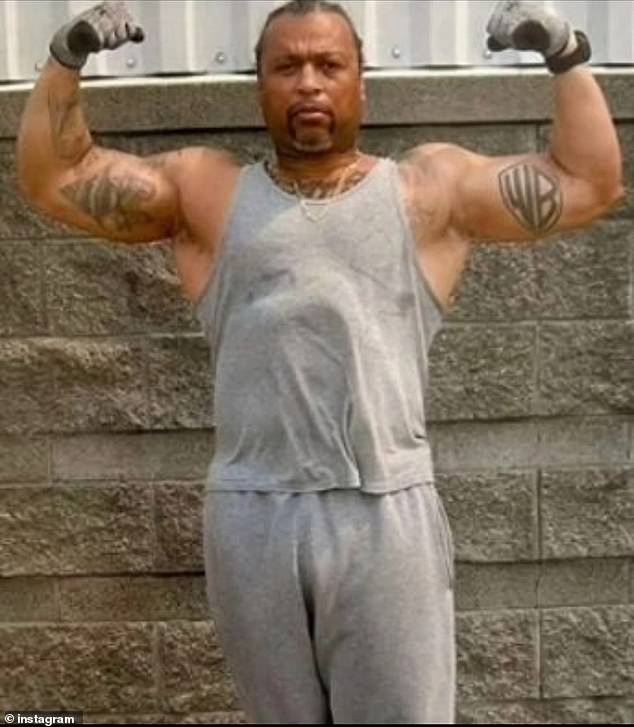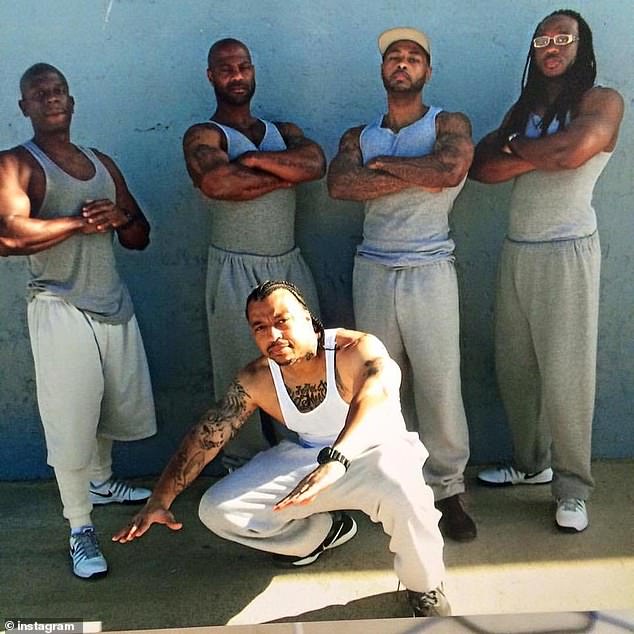Black Mafia Family co-founder Big Meech is seen inside Miami halfway house after release from federal prison
Big Meech, the infamous co-founder of the Black Mafia Family crime syndicate, has been spotted at a Miami halfway house following his release from federal prison.
Demetrius “Big Meech” Flenory, 56, was photographed Saturday in an all-black outfit with his arm around another man at the facility where he will serve the remainder of his sentence for helping to set up a nationwide operation for money laundering and drug trafficking.
He was arrested in October 2005, when the Drug Enforcement Agency took down his and his brother’s nationwide drug trafficking operation, and was sentenced in 2008 to 30 years behind bars.
But earlier this year, a judge shortened his sentence by nearly three years after his attorney argued that he remained an upstanding citizen while serving his time, including by getting his GED, doing well in other classes and staying out of trouble .
Demetrius “Big Meech” Flenory was arrested in October 2005 when the Drug Enforcement Agency took down his and his brother’s nationwide drug trafficking operation.

The now 56-year-old was pictured Saturday in an all-black outfit with his arm around another man at the Miami halfway house where he will serve the remainder of his sentence.
The lawyer, Brittany K Barnett, told TMZ Meech used his time in prison to focus on personal growth and said he now has the opportunity to start a new chapter in his life.
His release was celebrated by Lebron James, who took to social media to post “Welcome home Big Meech!!” to write. with a greeting emoji.
The Lakers star’s praise sparked backlash from fans who were disappointed that the Lakers star would congratulate a convicted drug trafficker.
“Lebron supports drug dealers?!?!?!?! Not my goat,” one user wrote on X.
Meech founded Big Mafia Family, also known as BMF, in 1985 as a creative agency and hip-hop label with his brother Terry Lee, also known as ‘Southwest Tee’.
It promoted and was associated with emerging hip hop artists such as Jay Z, Newsweek reports.
But in the early 2000s, federal agents determined that the company was merely a front for a nationwide cocaine trafficking and money laundering scheme in which the brothers raked in more than $270 million.
They said Demetrius was based in Atlanta and handled distribution, while Terry in Los Angeles handled shipments of the drug from Mexican drug cartels.

He had founded Big Mafia Family, also known as BMF, in 1985 as a creative agency and hip-hop label with his brother Terry Lee, also known as ‘Southwest Tee’.
The The Organized Crime Drug Enforcement Task Force and the Drug Enforcement Agency’s Special Operations Division relied on information from low-level dealers and high-ranking distributors working for BMF in their investigation as they seized large quantities of drugs.
In October 2005, the DEA conducted a large-scale raid, arresting thirty members of the operation.
Agents also seized $2 million in cash and assets – including guns and two and a half kilos of cocaine, while other law enforcement agents seized $21 million in assets – including cash, jewelry, 13 homes in metro Detroit , Los Angeles and Georgia. as well as three dozen vehicles.
Officers had also tapped Terry’s phone and overheard a conversation in which he expressed concern about Demetrius’ excessive partying and the damage it was doing to their business.
The two brothers were later indicted, with prosecutors presenting 900 pages of tapped conversation transcripts from Terry’s phone over the course of five months.
They were charged under the Continuing Criminal Enterprise Statute, conspiracy to distribute five kilograms or more of cocaine, possession with intent to distribute more than 500 grams of cocaine, conspiracy to launder monetary instruments and two counts of possession with intent to distribute to distribute more than five kilograms. of cocaine.
Meanwhile, the Treasury Department reported in 2006 that 16 others had been charged with conspiracy to distribute cocaine and with money laundering, bringing the total number of those involved in the crime syndicate to 49. But by 2009, that number had risen to 150.

Demetrius was sentenced to 30 years in prison for setting up the criminal enterprise

His attorney argued for a reduced sentence earlier this year, noting that he earned his GED in prison and has maintained good behavior
The Flenory brothers ultimately pleaded guilty to operating an ongoing criminal enterprise “involving the large-scale distribution of cocaine in the United States from 1990 through 2005,” according to court documents.
They were subsequently sentenced to 30 years behind bars each in November 2007.
“The BMF was a violent, sophisticated drug trafficking and money laundering organization that began right here in Detroit, Michigan,” Special Agent Robert Corso said at the time.
“Terry and Demetrius Flenory expanded what was a small, local operation into a multi-state, multi-million dollar criminal enterprise with direct ties to Mexico-based drug cartels.
“Today’s convictions show that no matter how big the operation, or how much money a drug trafficker makes illegally, the law and justice will eventually catch up,” he said.
The officer added, “This community and communities across the United States are safer now that the Flenory Brothers are behind bars.”
Terry was released from home detention on May 5, 2020, after being provided with compassionate care due to ill health during the COVID pandemic, and Demetrius was transferred from FCI Coleman Low in Wildwood, Florida last week to the halfway house supervised by the Bureau of Prison’s Miami Residential Re-entry Program.
